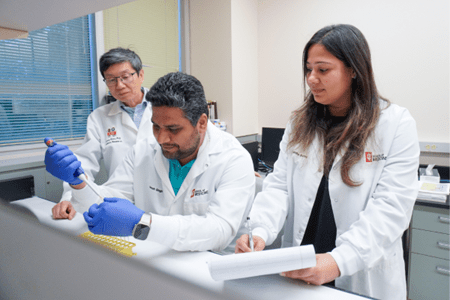INDIANAPOLIS — Indiana University School of Medicine scientists have developed a new method that shifts the behavior of immunosuppressive cells in tumors, turning them from cancer protectors into tumor fighters. The study, recently published in Science Immunology, could lead to enhanced treatments for aggressive cancers like triple-negative breast cancer, colorectal cancer and melanoma.
The immunosuppressive cells are called regulatory T cells, a type of white blood cell that is known for keeping the immune system in balance, thus preventing the development of autoimmune diseases and allergies. However, within the tumor, these cells can block the immune system from detecting and attacking cancer cells.
“Regulatory T cells are very important in keeping our immune system in check, but trying to eliminate them with drugs can cause dangerous autoimmune diseases in patients, which isn’t a practical approach,” said Baohua Zhou, PhD, co-corresponding author of the study, a professor of pediatrics and microbiology and immunology at the IU School of Medicine and a researcher with the Indiana University Melvin and Bren Simon Comprehensive Cancer Center. “Our goal is to modify how regulatory T cells function, so they fight against tumors instead of protecting them.”
The researchers focused on a gene called FOXP3, which controls the development and function of regulatory T cells. Humans naturally make two versions of the FOXP3 protein, a full-length version and a short one. In their study, the scientists developed a novel candidate drug, known as a morpholino, which specifically targets FOXP3 and forces regulatory T cells to predominantly produce the short version.
“By switching which FOXP3 version the cells express, our drug reprograms the tumor-protective regulatory T cells into helper-like cells that help other immune cells to destroy the tumor from the inside,” said Naresh Singh, PhD, co-first author of the study and a postdoctoral fellow in medical and molecular genetics at the IU School of Medicine. “This breakthrough offers a new approach towards boosting cancer immunotherapy and ultimately improving treatment outcomes for breast cancer patients.”
The authors found that mice producing only the short version of FOXP3 completely cleared triple-negative breast cancer tumors. The specificity and efficacy of their morpholino drug in triple-negative cancer treatment were confirmed using a newly developed mouse model that mimics how FOPX3 is expressed in humans. The morpholino treatment also showed promising results in the laboratory using tumor tissue samples from human breast and colorectal cancer patients.
“Our preclinical tests showed incredible results in triple-negative breast cancer, one of the most aggressive and deadly forms of the disease,” Zhou said. “We also have data showing encouraging results in other tumor types, suggesting this approach could have a broad impact by boosting anti-tumor immune responses in a wide range of patients.”
Future efforts will focus on advancing this patent-pending morpholino technology into clinical trials to evaluate its safety and effectiveness in cancer patients.
Additional IU co-authors of the study include Yujing Li, Chuanpeng Dong, Samantha Sharma, Zhuolong Zhou, Jianguang Du, Maya Haouili, Emily Hopewell, Yunlong Liu, Mateusz Opyrchal, Xinna Zhang and Xiongbin Lu.
This research was supported by funding from the National Institutes of Health and the Mark Foundation for Cancer Research.
About the Indiana University School of Medicine
The IU School of Medicine is the largest medical school in the U.S. and is annually ranked among the top medical schools in the nation by U.S. News & World Report. The school offers high-quality medical education, access to leading medical research and rich campus life in nine Indiana cities, including rural and urban locations consistently recognized for livability. According to the Blue Ridge Institute for Medical Research, the IU School of Medicine ranks No. 13 in 2024 National Institutes of Health funding among all public medical schools in the country.
Writer: Jackie Maupin, jacmaup@iu.edu
For more news, visit the IU School of Medicine Newsroom: medicine.iu.edu/news




